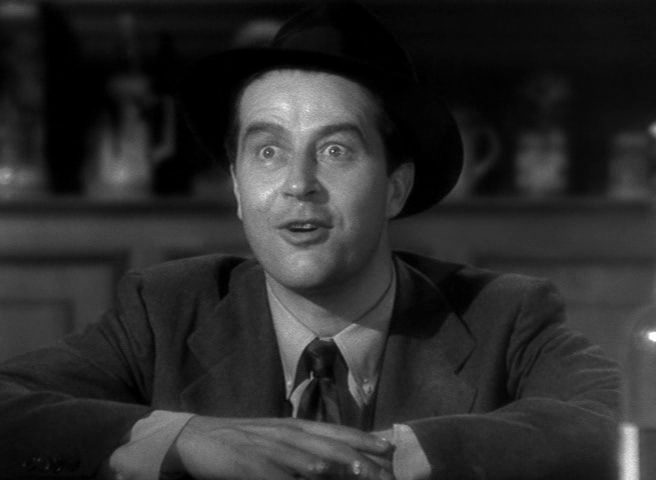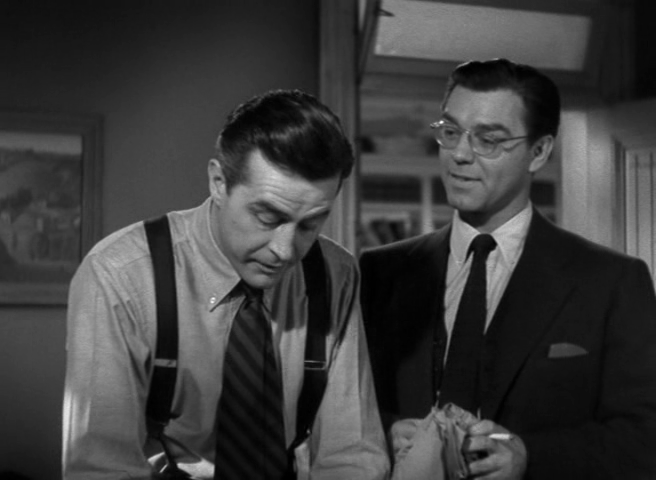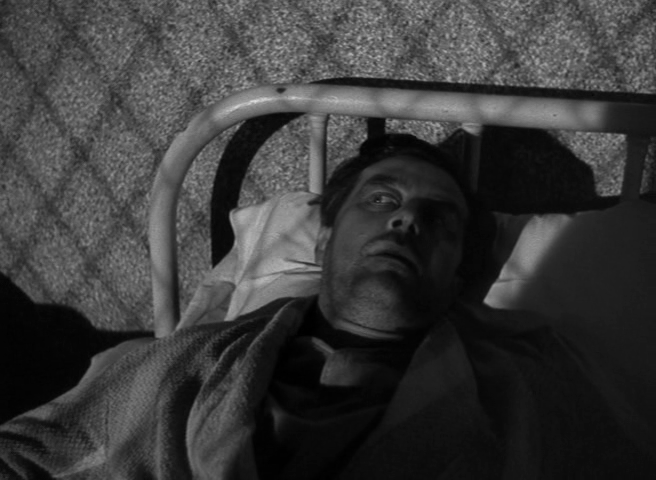Lost Weekend, The (1945)
“Most men lead lives of quiet desperation. I can’t take quiet desperation!”
|
Synopsis: |
|
Genres, Themes, Actors, and Directors:
Response to Peary’s Review: Since its release, of course (when NY Times critic Bosley Crowther referred to it as “shatteringly realistic and morbidly fascinating”), countless other films — too many to list here — have tackled the sticky topic of alcoholism and/or drug addiction, thus lessening the inherent shock value of The Lost Weekend for modern viewers. Yet on its own terms, the film remains a well-told tale of “a several-day [nightmarish] binge that almost costs [a man] his loyal girlfriend… and his life.” As Peary notes, the “dialogue is tough and cynical” (“She knows she’s clutching a razor blade, but she just won’t let go!”), and “Wilder makes strong use of New York streets and backgrounds” by blending “harsh expressionistic visuals indoors with washed-out shots of the city to convey mood changes in Milland”. With a running time of 101 minutes, the film thankfully never feels too long; from the tensely scripted and filmed opening sequence (in which Milland tries to distract his brother long enough to pack a hidden bottle of alcohol that’s dangling from a rope outside his window sill), to the justifiably lauded sequence in which Milland walks the streets of New York in desperate search of a pawn shop (only to find that they’re all closed on Yom Kippur), we’re genuinely curious to know what kind of trouble Milland will find himself in next, and how he’ll worm his way out. Most problematic for me, however, is the fact that “Milland (who usually played nice guys) is mean right from the beginning”. While Wilder and Brackett should be commended for not “pull[ing] any punches” in their portrayal of a man who all but the most loyal of friends and family members would have given up on long ago, it’s slightly discomfiting to be rooting for someone so utterly unlikable. Milland’s Don Birnam comes across like a self-pitying whiner who needs a serious kick in the pants to get himself back in gear; even a strategically placed flashback sequence — in which we get to see Milland meeting cute with Wyman at an opera — doesn’t help us like him any better. Fortunately, Milland’s performance is “strong”, and he carries the film surprisingly well. As Peary notes in his Alternate Oscars (where he votes for Boris Karloff in Val Lewton’s The Body Snatcher instead as Best Actor of the Year), Milland’s performance was “the best by any of the [official] nominees and maybe the best of his decent career, [but] he doesn’t make you feel enough empathy for his sick, troubled character”. Indeed, while Milland should certainly be commended for daring to “play an unsympathetic character for a change”, I don’t think society in general understood enough about the disease-driven nature of alcoholism at the time for Milland to do justice to the role; as a result, Birnam ultimately comes across as a pathetic anti-hero rather than the pitiable addict he really is. Redeeming Qualities and Moments:
Must See? Categories
(Listed in 1001 Movies You Must See Before You Die) Links: |





One thought on “Lost Weekend, The (1945)”
As noted, a must (more of a once-must) for historical relevance and for what got Milland the Oscar.
But I can’t help thinking that the Academy’s heap of statuette praise for this film caused thunder to be stolen a few years later from Wilder’s much better, richer and even darker ‘Sunset Boulevard’.
Just about halfway-through ‘TLW’ comes Milland’s best speech and some of the script’s best writing. In it, we actually – or more or less – learn why Milland’s character drinks. Essentially, what we appear to learn is that Milland’s Don Birnam isn’t really cut out to be a writer – and he knows it. That might easily make someone who wants to be a writer – but will never be a writer – drink. (I haven’t read the novel but I’ve read that the film omits one not-so-tiny detail, in that Birnam is haunted by a homosexual experience he had in college. Given the era in which the story takes place, that is a very compelling ingredient that robs the film – and Milland’s character – of power….It could be just me, but Wilder seems to have made some concession here: it’s possible that, since homosexuality could not really be addressed precisely in film at the time, Wilder seems to have alluded to it by having Frank Faylen, as Bellevue attendant ‘Bim’, stand in as a nod to the issue: Faylen comes off gay.)
Although I’m not sure of the reason for this egregious error – maybe it was to cement the supposition that all writers start a new project this way – but the script makes a very wrong move when Milland sits down to finally write his novel…starting with typing the title page, his name and a dedication to his girlfriend, “with all my love”. No real writer starts out in such a manner. All that that scene accomplishes is a highlighting of the fact that Birnam drinks for a real reason. (So, in a sense, maybe the scene isn’t an error after all.)
Along those lines, the film’s conclusion is not particularly convincing. It may be uplifting to a degree but it derails a lot about the addictive personality.
All that said, much of the film is still rather gripping. And, yes, it does not wear out its welcome. There is an awful lot of truth in ‘TLW’, and in many ways it’s very gutsy for the time, so the film is certainly worth paying attention to.
A special thumbs-up for the often-appropriately-freaky score by Miklos Rosza – apparently the first to make use of the theremin, which makes us feel that the main character is in outer space…which is also appropriate.